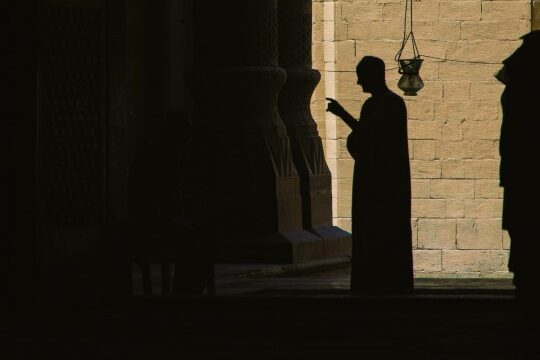The exalted status of the knowledge and power of the awliya’ is referred to in the verses “Those who strive hard in Us, We shall most surely guide them in our Ways” (29:69) and ittaqullah wa yu`allimukumullah (“Be aware of Allah, and Allah Himself will teach you” 2:282), and the hadith man `amila bi ma `alima warrathahullahu `ilma ma lam ya`lam (“Whoso acts upon what he knows, Allah will make him inherit a knowledge that he did not have”).40 Our master Bayazid al-Bistami cited this hadith in response to some “Salafi” types in his time who were asking him: “From where and from whom did you get this knowledge which you claim to have?”41 The Shaykh al-Hakim42 al-Tirmidhi in the second chapter of his Adab al-muridin describes such striving as a kind of door which leads to nearness to Allah, and Shaykh Abd al-Qadir al-Gilani refers to the knowledge and power that result from it in Discourse 16 of Futuh al-ghayb:
And fear Allah and He will teach you, then He will invest you with the power of controlling the universe with a clear permission which will have no obscurity in it… and He has done this with many of His Prophets and awliya and people especially favored from among the children of Adam.
To receive such knowledge is called a karama [gift] for the saint and a mu`jiza [act that disables opposition] for the Prophet. The process of receiving it is similarly differentiated: as wahy [revelation] for the latter and ilham [inspiration],ru’ya [vision], kashf [disclosure], firasa [piercing sight], mubashshira [glad tidings from Allah], mukashafa [disclosure], mushahada [mutual vision], or mukhataba [divine conversation] for the former. Shaykh `Abd al-Qadir al-Gilani said in Discourse 9 of his Futuh al-ghayb:
To awliya’ and abdal (Substitute-saints) are disclosed such workings of Allah in the course of kashf and mushahada as overwhelm the reasoning power of man and shatter into pieces all habits and customs.
al-Siraj al-Tusi in his famous book al-Luma` (The lights), a compilation of the sayings of the Sufis, mentions the following two definitions of the conditions of kashf:
Abu Muhammad al-Jurayri said: “Whoever does not work to fulfill what lies between him and Allah the Exalted by way of godfear and vigilance, will never reach unveiling and contemplation.” al-Nuri said: “The uncoverings of the eyes are through eyesight, and the uncoverings of the hearts are through connection (ittisal).”43
One of the highest examples of such favor is undoubtedly the meeting and true vision of the Prophet, which is a reality established in the hadith of seeing the Prophet in dream, and documented through the relations of the trustworthy from the Companions to the Successors and their Successors down to our day. Some of these relations have been recorded in Suyuti’s fatwa Tanwir al-halak fi imkan ru’yat al-nabi wal malak (The illumination of intense darkness through the possibility of seeing the prophet and the angels) in his Hawi li al-fatawi. We have already mentioned in the section discussing the evidence that the Prophet hears and sees us al-Haytami’s answer in his Fatawa hadithiyya whereby it is possible for Allah’s Friends to meet the Prophet while awake in our time.44 They can also meet al-Khidr, as Sakhawi relates about Imam Nawawi:
It is well-known that he (Imam Nawawi) used to meet with al-Khidr and converse with him among many other mukashafat.45
The exalted status of the saints’ firasa is mentioned in the hadith whereby the Prophet said: ittaqu firasat al-mu’min fa innahu yara bi nurillah “Beware the vision of the believer, for he sees with the light of Allah,” then he recited the verse: “Therein lie portents for those who read the signs” (al-mutawassimin) (15:75).46 Tirmidhi narrated this authentic hadith in the Book of the Commentary of Qur’an in his Sunan and said that some of the commentators have explained “Those who read the signs” as meaning: those who possess vision (al-mutafarrisin).” al-Sakhawi in al-Maqasid al-hasana (#23) mentions another authentic hadith whereby the Prophet said: “Allah has servants who know (the truth about people) through reading the signs” (tawassum).47
It is established in the sound hadith that at the end of time every Muslim will be endowed with this ability to “ready the signs,” so that he will be able to recognize the dajjal or antichrist as a disbeliever by reading the letters K-F-R over his forehead.48
It is related that the firasat of a pious shaykh was at the origin of Ibn Hajar al-`Asqalani’s decision to take up the study of jurisprudence rather than devote himself exclusively to hadith:
Ibn Hajar said: “He (Muhibb al-Din al-Wahidi al-Maliki) said to me: “Invest some of that energy of yours into fiqh, for I see by way of firasat that the scholars of this country (Egypt) are going to be depleted, and there will be need of you, so don’t indulge yourself.” And his word to me helped me greatly, and I still pray for him for that reason, may Allah have mercy on him.”49



